-
Board-Certified
Fellowship-Trained
Physical Medicine
& Rehabilitation
Choosing the right doctor
There are tremendous advances taking place in medicine today, but in order to benefit from them, the healthcare consumer must take an active role. The best healthcare will not find you; you have to seek it out.
While the United States offers the highest standard of healthcare in the world, there is still huge treatment variation based on the doctor you see. Bottom line — the doctor you choose will determine the quality of care you will receive. Here is an overview of how to navigate through the healthcare system to find the best doctor for you.
The era of the super-specialist
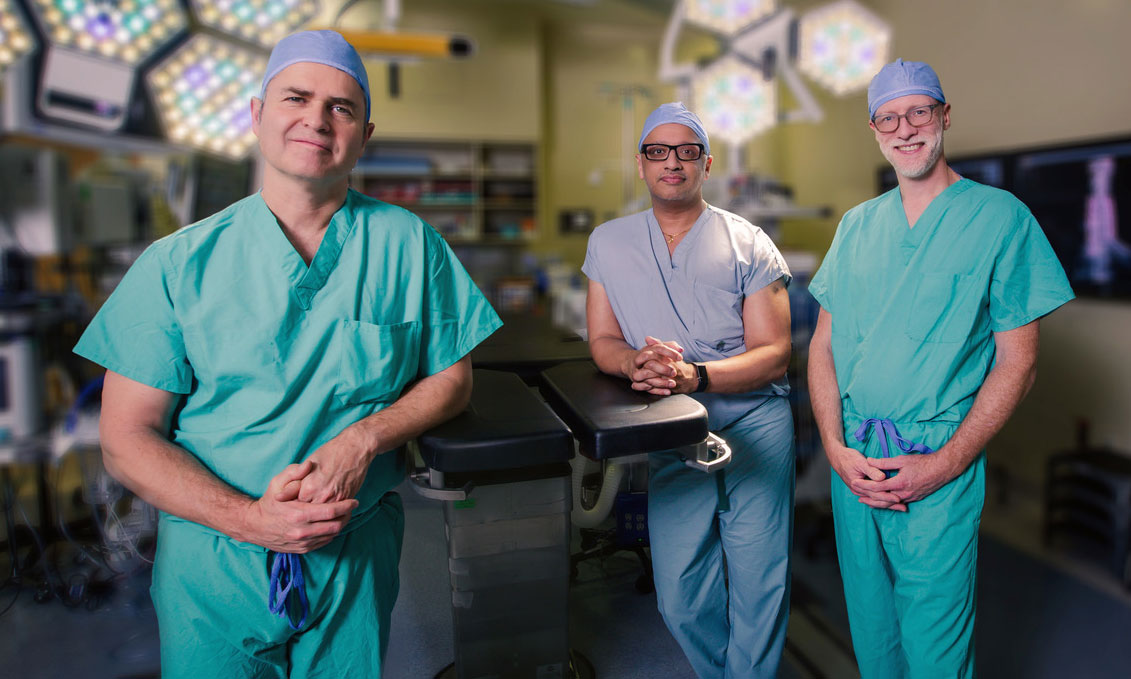 First, the healthcare consumer needs to understand that today’s
medical field is divided into very narrow specialty categories. Twenty
years ago, the specialty of orthopedic surgery addressed a variety
of problems including knee, foot, hip, shoulder, hand and spine. While
an orthopedic surgeon in a small rural town may still address all these
problems, most orthopedic surgeons today in larger cities specialize
in only one of those areas. Therefore, the educated healthcare consumer
with a knee problem should seek out an orthopedic surgeon who only
works on knees. This increases the likelihood that the surgeon will
be more proficient in surgery and will use the most advanced surgical
techniques available for knees.
First, the healthcare consumer needs to understand that today’s
medical field is divided into very narrow specialty categories. Twenty
years ago, the specialty of orthopedic surgery addressed a variety
of problems including knee, foot, hip, shoulder, hand and spine. While
an orthopedic surgeon in a small rural town may still address all these
problems, most orthopedic surgeons today in larger cities specialize
in only one of those areas. Therefore, the educated healthcare consumer
with a knee problem should seek out an orthopedic surgeon who only
works on knees. This increases the likelihood that the surgeon will
be more proficient in surgery and will use the most advanced surgical
techniques available for knees.
Spine specialists can include neurosurgeons specialized
in spine surgery, orthopedic surgeons specialized in spine surgery,
physical medicine doctors, anesthesiologists and physical therapists
who specialize in the nonsurgical relief of back and neck pain symptoms.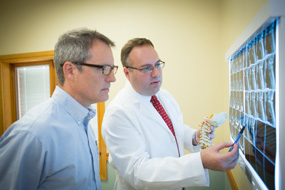
As with anything in life, practice makes perfect. All clinical outcome studies confirm that the more times a surgeon performs a procedure, the better they become at it. Consequently, spine surgeons who perform more than 150 surgeries per year will be more proficient than those who perform 50 each year.
A second indicator of quality is training and experience of the physician. One might believe that a younger physician a few years out of training might be at a disadvantage compared to a surgeon who has practiced for 25 years or more. However, this is not an accurate generalization. In reality, an older physician may be more comfortable using traditional techniques, while a younger, fellowship-trained physician may be trained in the most modern, minimally invasive techniques and instrumentation. Age is not necessarily a good indicator of quality.
About using your health insurance plan as a guide
Most people are surprised to learn that their health insurance provides little help in finding the best specialist within a specific niche. Offering a preferred provider directory of specialists gives no real indicator of quality. Inclusion in a PPO directory typically only means that the physician has agreed to accept a discounted rate for payment from the insurance company. In this sense, “preferred provider” simply means that the insurance company would “prefer” you to see doctors who have agreed to accept a discount. These discounts can be steep, depending upon the health insurance plan.
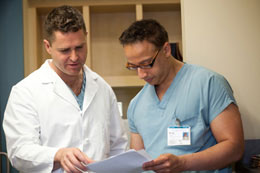 Unlike other industries, in which market demand and the
highest quality product commands the highest price, healthcare is an
industry that is woefully behind the times. But that is changing.
Unlike other industries, in which market demand and the
highest quality product commands the highest price, healthcare is an
industry that is woefully behind the times. But that is changing.
A growing trend nationwide is that super-specialists, who are in the highest demand by virtue of reputation and outcomes, can be less motivated to accept discounted reimbursement from some health plans. These super-specialists typically have full schedules and don’t need to discount their services to attract patients. Consequently, they are opting not to be included in a PPO panel, while other physicians may have to rely on discounting to attract patients.
Most PPO plans have out-of-network benefits that enable patients to see a physician who is not listed in the PPO directory. Typically, the person may have to pay a larger percent of the bill and a larger deductible. But for complex problems, this still may be the more prudent approach in the long run to access the most current technology and the specialist with the least invasive treatment alternatives.
More and more employers are recognizing that traditional healthcare plans have historically done a poor job of establishing panels of physicians based on quality care. Consequently, several employers are seeking out centers of excellence for the treatment of complex problems like cancer, heart disease, neuroscience, organ transplants, joint implants and spine problems.
The business of being a super-specialist
Part of the problem related to PPO panel discounting is that it penalizes top super-specialists who invest in the most advanced and expensive technology for their offices, highly trained physician assistants and a modern clinic facility with multiple capabilities under one roof for patient convenience. By being on a PPO panel, a super-specialist who has invested additional years in training, fellowships and advanced, continuing education courses in the latest procedures must accept the same level of payment as a generalist who has not similarly invested in training, support staff and clinic facilities.
In this sense, health insurance plans are not able to steer consumers to the highest quality physicians. They are, however, in a difficult position because they find themselves somewhat handcuffed and unable to direct consumers to the highest quality physicians. On one hand, every healthcare plan medical director knows that the best physicians and super-specialists will save money as their outcomes improve and as they provide minimally invasive surgery options that are less risky. These directors are trying to determine ways to subtly encourage patients to seek out centers of excellence for complex problems. However, they are also concerned with possible litigation from other physicians that may develop if they overtly favor one center over other physicians.
Under this current scenario, healthcare consumers are left on their own to search for a top healthcare provider. It is their responsibility to research the best center of excellence for treatment of a complex health problem.
How to find a super-specialist
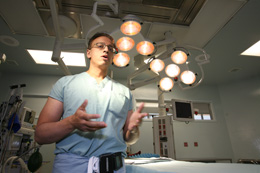 There are many ways to identify the best specialist within a given
area. A good place to start is to consult a family practice doctor
who addresses your general healthcare needs. This “primary
care” doctor will usually know the best super-specialists within
a specific region. Also, since this primary care physician may have
referred patients to that specialist before, they may have seen firsthand
their clinical outcomes after surgery. If these outcomes are poor,
the primary doctor will not refer additional patients.
There are many ways to identify the best specialist within a given
area. A good place to start is to consult a family practice doctor
who addresses your general healthcare needs. This “primary
care” doctor will usually know the best super-specialists within
a specific region. Also, since this primary care physician may have
referred patients to that specialist before, they may have seen firsthand
their clinical outcomes after surgery. If these outcomes are poor,
the primary doctor will not refer additional patients.
On the downside, this referral process abdicates the selection process to someone else. The educated healthcare consumer would do well to perform secondary research to identify the best possible specialists and clinics within a given specialty.
The Internet can provide a wealth of helpful information. The educated consumer can locate information on a doctor’s education, training, clinic and area of specialization.
Cues on physician competence
Fellowship training, the highest level of training in the United States, can be an indicator that the physician has invested an additional year in a specific area of specialization. Note where the physician has trained. Training at a large or prestigious institution would expose the physician to more complex cases, which in turn makes them more proficient in their chosen specialty.
Board certification is another criteria that indicates a physician has met the competency standards within an area of specialization, as judged by the specialty board. Board certification typically requires that a physician has been in practice for several years since graduating from medical school and has passed a rigorous written and oral exam.
Using Internet complaint boards
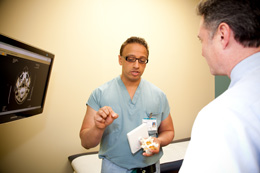 TripAdvisor is a very successful Internet site that features traveler comments about hotels, resorts and restaurants. But is a person's rating of a hotel meal the same as that person’s ability to understand diagnosis and treatment of complex neurological disorders?
TripAdvisor is a very successful Internet site that features traveler comments about hotels, resorts and restaurants. But is a person's rating of a hotel meal the same as that person’s ability to understand diagnosis and treatment of complex neurological disorders?
One survey found that 62 percent of patients are using online reviews in complaint boards as their first step in choosing a doctor, and 19 percent use complaint boards like YELP, Vitals, Healthgrades and RateMDs to validate their choice before making an appointment.
Unfortunately, studies are now revealing that such complaint boards are not indicators of physician quality simply because consumers don’t have the data to judge quality of medical care.
A recent 2017 study conducted by ConsumerMedical, a leading health care decision support company, revealed that there may actually be an INVERSE correlation to quality as featured by complaint boards. The ConsumerMedical study found that vast majority of top-rated specialty physicians on YELP, Vitals and Healthgrades are NOT the highest ranked physicians when it comes to examining actual clinical outcome data related to their medical specialty.
In the study, ConsumerMedical identified the top 10 ranked physicians on YELP, Vitals and Healthgrades across five common specialties in New York, Chicago, and Los Angeles. They then compared these complaint board rankings to a list of the 10 physicians with the highest clinical outcome scores in the same cities. The ConsumerMedical clinical ranking was based on more than 5 billion data points that measure physician performance on variables such as: patient readmission rates; surgical infection rates; average length of stay; procedure volume; and functional status outcomes. Only 2 percent of physicians ranked as top 10 by YELP, Vitals and Healthgrades showed up as top performers when examining actual clinical outcomes.
“This research confirms what we have long suspected,” concludes David Hines, CEO of ConsumerMedical. “Online patient reviews tend to reflect a patient’s care experiences, such as the physician’s bedside manner. While these attributes are important, they are simply not the main indicators of a physician’s overall quality; sadly you can have a very kind orthopedic surgeon whose patients have hospital readmission rates that are through the roof.”
So the healthcare consumer needs to be mindful that complaint boards indicate merely the bedside manner of the physician rather than quality of care.
Get a second opinion
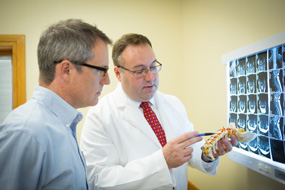 Most health insurance plans advise or require that the healthcare consumer receive a second opinion when treatment involves a complex surgical procedure. This is excellent advice. If you have received two identical, unbiased opinions related to your diagnosis and recommended treatment, you can proceed accordingly with more confidence that you are pursuing the right approach. To receive a second opinion click here.
Most health insurance plans advise or require that the healthcare consumer receive a second opinion when treatment involves a complex surgical procedure. This is excellent advice. If you have received two identical, unbiased opinions related to your diagnosis and recommended treatment, you can proceed accordingly with more confidence that you are pursuing the right approach. To receive a second opinion click here.
If the two opinions disagree, you should examine the training and qualifications behind each opinion to determine which is most likely the correct recommendation. Another option is to pursue a third opinion, but this can add to your confusion.
Be willing to travel
The trend in medicine is that the best specialists are creating centers of excellence that focus on certain problems like cancer, neuroscience, spine problems, diabetes, asthma, etc. Because the cost of developing these centers is high, they typically exist only in larger cities. Consequently, if you need complex surgery, be prepared to travel.
The physician visit
The best specialists within a given niche will typically provide all the appropriate nonsurgical and surgical treatment options for your problem, along with the pros and cons of each approach. In some cases, treatment may include watchful waiting. If your doctor is unwilling to answer questions about your diagnosis or treatment, you’re in the wrong place. Go find another doctor.
Be a good patient
After all the searching, if you’ve found a good doctor, the rest is in your hands. To be a good patient, you must comply with the physician’s recommendations and prescriptions. Too many times, it’s natural to want a magic pill or miracle surgery to provide an easy route back to activity. However, you should always view surgery as the last card to be played, after all nonsurgical options are explored.
For nonsurgical treatment alternatives to work, the patient must often follow physician and therapist prescriptions, which may include a commitment to therapy. For spine and joint problems, this may mean incorporating special strengthening exercises that rebuild supporting muscles, so that surgery isn’t necessary. While athletes are familiar with the required commitment and pain associated with the exercise gym, others may not. It can be new territory for many people, but it is essential if you are to give nonsurgical options a chance to work.
Physician Biographies
-
 Karl Boellert, MD
Karl Boellert, MD -
 Mathew Gowans, MD
Mathew Gowans, MD- Board-Certified
Physical Medicine
& Rehabilitation
- Board-Certified
-
 Michael P.B. Kilburn, MD
Michael P.B. Kilburn, MD-
Board-Certified
Fellowship-Trained
Spinal Neurosurgeon
-
Board-Certified
-
 Sumeer Lal, MD
Sumeer Lal, MD-
Board-Certified
Fellowship-Trained
Spinal Neurosurgeon
-
Board-Certified
-
 John Cole, MD
John Cole, MD-
Board-Certified
Fellowship-Trained
Spinal Neurosurgeon
-
Board-Certified
Back to Life Journal

Home Remedy Book

![]() Website Design & Educational Content © Copyright 2023 Prizm Development, Inc.
Developing Centers of Excellence for Better Healthcare.
Website Design & Educational Content © Copyright 2023 Prizm Development, Inc.
Developing Centers of Excellence for Better Healthcare.
Prizm is the most experienced developer of spine and orthopedic centers in the U.S. with content-rich educational web sites for physicians.
